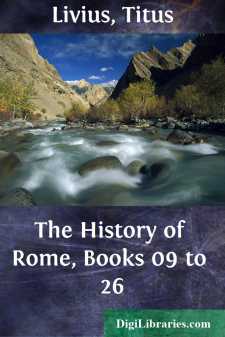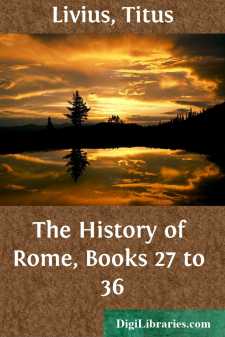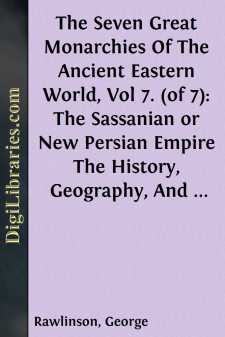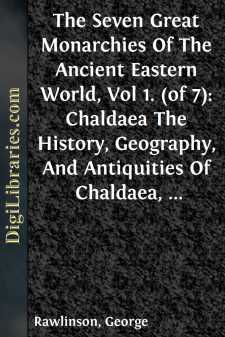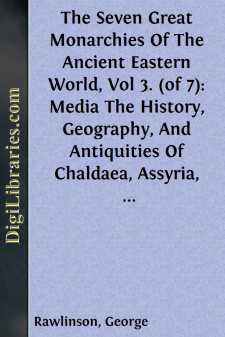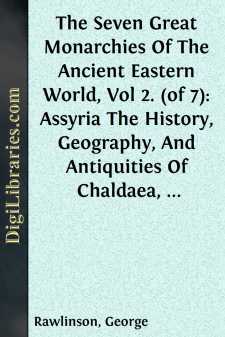History
- Africa 30
- Americas (North Central South West Indies) 50
- Ancient
- Asia 58
- Australia & New Zealand 8
- Canada 41
- Caribbean & West Indies 1
- Civilization 20
- Eastern Europe 12
- Europe 310
- Expeditions & Discoveries 60
- General 77
- Historical Geography 1
- Jewish 9
- Latin America 3
- Medieval 8
- Middle East 13
- Military 248
- Revolutionary 8
- Study & Teaching 5
- United States 353
- Western Europe 56
- World 13
Ancient Books
Sort by:
by:
Titus Livius
BOOK I. The coming of Æneas into Italy, and his achievements there; the reign of Ascanius in Alba, and of the other Sylvian kings. Romulus and Remus born. Amulius killed. Romulus builds Rome; forms a senate; makes war upon the Sabines; presents the opima spolia to Jupiter Feretrius; divides the people into curiæ; his victories; is deified. Numa institutes the rites of religious worship; builds a...
more...
by:
Titus Livius
BOOK IX.B.C. 321-304 23 Titus Veturius and Spurius Postumius, with their army, surrounded by the Samnites at the Caudine forks; enter into a treaty, give six hundred hostages, and are sent under the yoke. The treaty declared invalid; the two generals and the other sureties sent back to the Samnites, but are not accepted. Not long after, Papirius Cursor obliterates this disgrace, by vanquishing the...
more...
by:
Titus Livius
BOOK XXVII. Cneius Fulvius, proconsul, defeated by Hannibal and slain; the consul, Claudius Marcellus, engages him with better success. Hannibal, raising his camp, retires; Marcellus pursues, and forces him to an engagement. They fight twice; in the first battle, Hannibal gains the advantage; in the second, Marcellus. Tarentum betrayed to Fabius Maximus, the consul. Scipio engages with Hasdrubal, the...
more...
by:
Richard Crawley
CHAPTER I The State of Greece from the earliest Times to the Commencement of the Peloponnesian War Thucydides, an Athenian, wrote the history of the war between the Peloponnesians and the Athenians, beginning at the moment that it broke out, and believing that it would be a great war and more worthy of relation than any that had preceded it. This belief was not without its grounds. The preparations of...
more...
Of Ammianus Marcellinus, the writer of the following History, we know very little more than what can be collected from that portion of it which remains to us. From that source we learn that he was a native of Antioch, and a soldier; being one of the prefectores domestici—the body-guard of the emperor, into which none but men of noble birth were admitted. He was on the staff of Ursicinus, whom he...
more...
by:
Procopius
CHAPTER I The wife of Belisarius, whom I have spoken of in my previous writings, was the daughter and grand-daughter of chariot-drivers, men who had practised their art in the circus at Byzantium and at Thessalonica. Her mother was one of the prostitutes of the theatre. She herself at first lived a lewd life, giving herself up to unbridled debauchery; besides this, she devoted herself to the study of...
more...
by:
George Rawlinson
CHAPTER I. Condition of the Persians under the Successors of Alexander—under the Arsacidce. Favor shown them by the latter—allowed to have Kings of their own. Their Religion at first held in honor. Power of their Priests. Gradual Change of Policy on the part of the Parthian Monarchs, and final Oppression of the Magi. Causes which produced the Insurrection of Artaxerxes. "The Parthians had been...
more...
by:
George Rawlinson
CHAPTER I. GENERAL VIEW OF THE COUNTRY. "Behold the land of the Chaldaeans."—ISAIAH xxiii. 13. The broad belt of desert which traverses the eastern hemisphere, in a general direction from west to east (or, speaking more exactly, of W. S. W. to N. E. E.), reaching from the Atlantic on the one hand nearly to the Yellow Sea on the other, is interrupted about its centre by a strip of rich...
more...
by:
George Rawlinson
CHAPTER I. DESCRIPTION OF THE COUNTRY. Along the eastern flank of the great Mesopotamian lowland, curving round it on the north, and stretching beyond it to the south and the south-east, lies a vast elevated region, or highland, no portion of which appears to be less than 3000 feet above the sea-level. This region may be divided, broadly, into two tracts, one consisting of lofty mountainous ridges,...
more...
by:
George Rawlinson
CHAPTER I.DESCRIPTION OF THE COUNTRY."Greek phrase[—]"—HEROD. i. 192. The site of the second—or great Assyrian-monarchy was the upper portion of the Mesopotamian valley. The cities which successively formed its capitals lay, all of them, upon the middle Tigris; and the heart of the country was a district on either side that river, enclosed within the thirty-fifth and thirty-seventh...
more...



